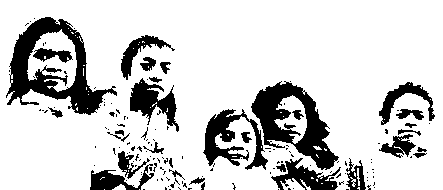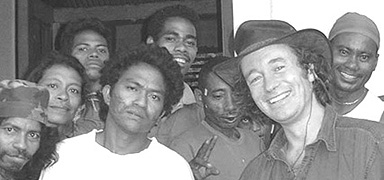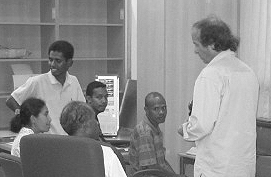
|
| Tekee Media Inc |
|
CAMS TIMOR LESTE
[Centro Audio-Visual Max Stahl Timor Leste - for information, click here]
Dili, East Timor
Tekee Media Inc is working with Max Stahl and CAMS Timor Leste in three ways: it is
Funds are being sought to complete the archiving of this historic material and to begin work on other key material offered by film-makers in a Resource Centre for Education and Peace Studies based in East Timor.
Tekee Media Inc
e-mail Max Stahl:
|
updated April 24 2005
CAMS Timor Leste
CAMS Timor Leste is an active audio-visual centre with two main functions: [1] the gathering and preservation of East Timor's history and culture in audio-visual form, and [2] the ongoing recording of music, culture and the nation-building process in East Timor.
The Centre gathers, copies, logs and transcribes, with time code references, audio-visual material, edited and un-edited, in the original languages of East Timor, and of its many foreign visitors, and seeks to translate these into Tetum, Portuguese and English in order to make the material accessible for education purposes to people in Timor and abroad.
CAMS Timor Leste has a unique record of East Timor's struggle, its occupations, its nation-building process, and its musical and visual culture. It contains the award-winning archive filmed during the resistance struggle by Max Stahl as well as by the leadership of East Timor's resistance in addition to some hundreds of hours of material gathered by Timorese and non-Timorese documenting both the struggle and re-birth of traditional communities as parts of the world's newest nation.
CAMS Timor Leste can provide window dubs and viewing copies of master material for broadcast and educational use and facilitate the purchase of relevant broadcast and other rights according to international copyright standards.
It has worked with UNICEF, facilitated internships for students from the University of Sydney, Charles Sturt University at Bathurst, and the University of Technology Sydney, and is developing links with the University of New South Wales, Charles Darwin University and the University of Auckland in New Zealand. CAMS Timor Leste is working in partnership with academic researchers in the areas of media studies, film studies, visual arts, anthropology, linguistics, development studies in various universities - including the universities of New York and Leiden - as well as with film production companies around the world, with NGOs and international bodies, in research, film production and documentation.
tel/fax: +44 1200 446018, +44 208 758 0937
Max Stahl (second right) with militia members in West Timor
Max won a scholarship to Oxford University, then began in the theatre as actor and director in the UK. He presented the BBC's most popular children's program, Blue Peter, for two years. Then he formed an independent company and made documentaries, news and features for UK, European and Worldwide TV, in Latin America, the former communist countries , the Caucasus, Baltic and the Balkans, and wrote scripts for feature films.
Max is perhaps best known worldwide for films on Indonesia and East Timor. He filmed the 1991 Dili massacre when more than 400 peaceful demonstrators were killed by Indonesian troops, 'breaking' the East Timor story internationally. His images in four major documentaries there over ten years and scores of news reports played a key part in forcing the referendum eventually granted - nine years later - to East Timor. His images from the mountains - where he alone stayed in September 1999 when all other TV journalists fled the murderous attacks of Indonesian-sponsored militia - played a key role in forcing the UN intervention which finally brought an end to Timor's occupation.
In 1999 Max taught film-making and produced a series of short films made from different perspectives in the Balkan conflict authored by local people from different communities in conflict. 2000 through 2002 he has been backed by NGOs working in the area on a project examining Justice and the UN role following the killings there.
In that year and the next Max won a series of major awards at the New York Film festival and at the UK Royal Television Society, and then won the world's premier award for independent camera journalism, the Rory Peck Award, backed by UK and world broadcasters.
major awards:
gold awards:
documentary films and key work:
Also: 'Labour of Love' (Thames TV); BBC War Series: 'Irregular', 'Front Line' (78') & 'El Salvador's Crucified Church' (C4 (UK), WGBH (USA), G (Fr)); 'Poor' (series, King TV (USA))
Max speaks and works in six languages and has written a number of feature film scripts, at various times in development in the UK, USA and Portugal involving international stars Emma Thompson & Martin Sheen. He has also written extensively for newspapers and radio in Britain, US, Canada, Australia and Europe.

appendix 1
by UNESCO, by Tekee Media Inc, and by private donations **
appendix 2
e-mail: maxstahl@gn.apc.org

[click on image to see larger version (104k) in colour]
Max Stahl is an award-winning cameraman, writer, director and producer who has worked in front of and behind the camera on television worldwide. For more than twenty years his films - for UK's ITV Channels 3 & 4, the BBC, and national broadcasters in France, Germany, Scandinavia, Australia, Canada and the USA - have been shown around the world. He has lived and filmed in Central America, the Far East, the former USSR, the Middle East and Europe. As producer, director, writer and cameraman he has worked with major US companies Discovery, National Geographic, and PBS, with NHK (Japan), NRK (Norway), ZDF & NDR (Germany), Gamma/AntenneII (France), RTP (Portugal) as well as the major UK & Australian broadcasters.
Walkley Award (Australia) (2002)
Rory Peck Award (UK International) (2000)
Royal Television Society Award (RTS, UK) Best Feature Documentary (1993)
RTS 'Technician (Cameraman) Of The Year' Runner-Up (2000)
Amnesty International Film Award (1992)
Kagoshima (Japan) (1992)
Barcelona documentary prize (Spain)
Oporto (Portugal) Festival Of The Americas Grand Jury Prize (US) (1984)
Houston International (three times: 1984, 87, 91)
San Francisco (1982)
New York Film Festival (two gold, two silver, three bronze: 1982, 98, 99, 2000, 03)
2003 BHHRG (Uzbekistan) UNESCO (Max Stahl Award-winning Audio-Visual Archive, Timor)
2002 Justice Denied (Channel 9, Australia); New York Film Fest Gold Award 2003, Timor Rise (UN)
2001 Terror In Reserve, Ming (feature script), Investigative News for ITN (contract)
2000 (ITN, APTV) runner-up, Royal Television Society Cameraman of the Year; winner, Rory Peck Award for Independent Camera Journalism; investigative filming in Indonesia and East Timor on 'The Reconciliation' and 'Terror In Reserve'
1999 'The Return' (28 mins) (Kosova/Macedonia); exec producer: six films in Macedonia; series of prize-winning news stories for ITN Channel 4 News in Albania, Macedonia, Kosova (two awards, New York Film Festival 2000); East Timor Mountains, Aug-Oct
1998 fiction scripts, news stories in Kosova (Channel 4) (finalist in France, and Rory Peck Award UK)
1996-7 'Sometimes I Must Speak Out Strongly' (52' 26", NRK, Norway, Australia, prod/dir/cam, portrait of Nobel Peace Prize Winner Bishop Belo of East Timor); news: Channel 4 (UK ITN)
1994 'The Second Massacre' (East Timor, ABC Australia, 20', prod/dir/camera)
1994 'Death Of A Nation' (Central UK, 78', prod/camera, Indonesia and EastTimor)
1993 'Out Of The Shadows: Shevardnadze' (52', prod/dir/cam, Georgia, Chechnia, Fuji (Japan), ORF(Austria), Discovery(USA))
1992-3 'The Hunt For Red Mercury'(prod/dir/cam, ex-USSR KGB and nuclear materials)
1991-2 'In Cold Blood: The Massacre Of East Timor'(52', YTV (UK) & worldwide, dir/cam)
1990 'Plunder' (looting archeological cities, Guatemala's jungle, C4 (UK)); 'Dispatches' (WGBH (USA), NDR (Germany), 52' & 40', prod/dir/camera)
1988 'Hashish Connection' (drugs & war, Lebanon, C4 GammaTV, France, Nat.Geo (US))
back to top:

